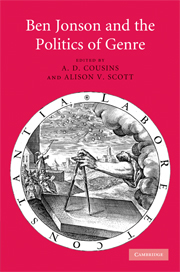Book contents
- Frontmatter
- Contents
- Notes on contributors
- Acknowledgements
- Introduction
- Chapter 1 Feigning the commonwealth: Jonson's Epigrams
- Chapter 2 The Jonsonian masque and the politics of decorum
- Chapter 3 The politics (and pairing) of Jonson's country house poems
- Chapter 4 Style, versatility, and the politics of the epistles
- Chapter 5 Jonson's politics of gender and genre: Mary Wroth and ‘Charis’
- Chapter 6 Jonson's metempsychosis revisited: patronage and religious controversy
- Chapter 7 Jonson's humanist tragedies
- Chapter 8 A generic prompt in Jonson's Timber, or Discoveries
- Bibliography
- Index
Chapter 1 - Feigning the commonwealth: Jonson's Epigrams
Published online by Cambridge University Press: 30 June 2009
- Frontmatter
- Contents
- Notes on contributors
- Acknowledgements
- Introduction
- Chapter 1 Feigning the commonwealth: Jonson's Epigrams
- Chapter 2 The Jonsonian masque and the politics of decorum
- Chapter 3 The politics (and pairing) of Jonson's country house poems
- Chapter 4 Style, versatility, and the politics of the epistles
- Chapter 5 Jonson's politics of gender and genre: Mary Wroth and ‘Charis’
- Chapter 6 Jonson's metempsychosis revisited: patronage and religious controversy
- Chapter 7 Jonson's humanist tragedies
- Chapter 8 A generic prompt in Jonson's Timber, or Discoveries
- Bibliography
- Index
Summary
At the start of his Epigrams Jonson successively evokes three notions in which we know he had particular and recurrent interest. Evoking and juxtaposing them, he offers at the start of his book a series of political representations that seem designed to govern the collection as a whole. They are of course not the only versions of the political generated in his book of epigrams. Nevertheless they are both those with which he chose to begin his work and arguably the most important insofar as, having been brought together in implicit affirmation of one another, they seem not so much to subordinate as to encompass the representations that follow. The notions are constancy, understanding, and kingship. Each is prominent in Epigrams and throughout Jonson's other writings – though necessarily with different degrees of emphasis, different frequency and inflection, depending on the demands of occasion and of genre. Each has therefore often received attention in commentary on the Jonson canon, although (as would be expected) that attention has been unequally given and at times has been indirect. Jonson emphasizes the notions but, just as they are not simple, neither does he simply evoke them; further, his juxtaposition of them is not least interesting because eutopian in the vision it unfolds.
The first of those notions, constancy, has usually been discussed (as far as the non-dramatic verse is concerned) in relation to Jonson's preoccupation with what he once called the ‘gathered self’. However, it has been considered ahistorically rather than otherwise.
- Type
- Chapter
- Information
- Ben Jonson and the Politics of Genre , pp. 14 - 42Publisher: Cambridge University PressPrint publication year: 2009



